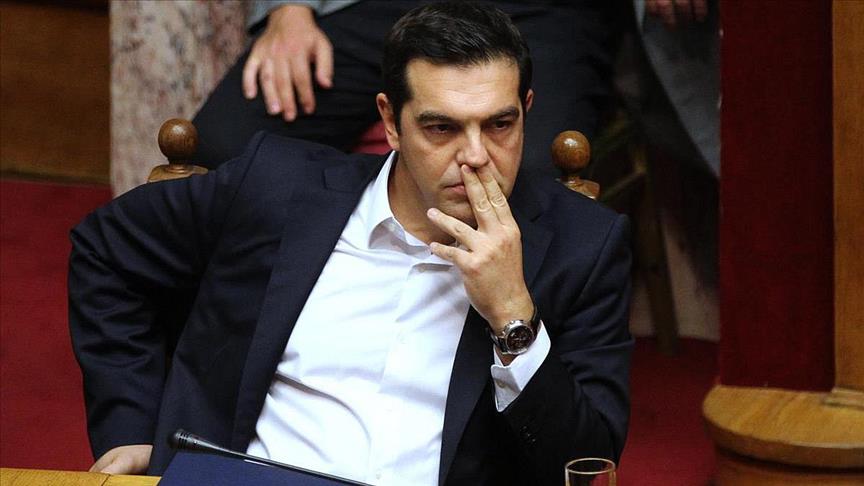
By Vasiliki Mitsiniotou
ATHENS
The International Monetary Fund said Wednesday that the Greek government could miss an important target in its implementation of the measures imposed by its three-year, €86 billion ($95.5 billion) bailout.
This is one of the tough challenges that the Greek government faces as it tries to put through a "multi-bill", including a slew of austerity measures imposed by the bailout deal with its European and institutional creditors – one of which is the IMF.
The bill is expected to be submitted in parliament on Oct. 12 and the deadline set by creditors for approval of the measures is Oct. 15.
“We are obliged to move forward without delay, to meet the end of the first review [by creditors]” Greek Prime Minister said in parliament Monday, confident that the government will succeed in meeting its current obligations.
Government debt unaccounted for
However, according to the latest Fiscal Monitor report from the IMF on Wednesday, Greeks may have to face additional austerity measures totaling 1.35 billion euros if the government is to meet its targets. The report states that 2015 will end with an estimated primary deficit – a measure of government revenues minus expenses – of 0.5 percent of GDP instead of the 0.25 percent deficit agreed upon in the bailout program. This is a discrepancy of €450 million ($510 million).
But the bailout agreement calls for Greece to not only narrow the deficit, but to reach an 0.5 percent surplus in 2016. To do this, the IMF said that extra austerity measures will be required in the period of the new agreement (2015-18) to the value of about €3.5 billion ($3.9 billion), if Greece is to meet the agreed-upon surplus target of 3.5 percent of GDP by 2018.
The IMF report also forecasts that the state debt could increase to 206.6 percent of GDP in 2016, as opposed to the 200.9 percent target in the bailout agreement for that year.
This means that Greece will continue missing its targets every year up to 2020, when the state debt will amount to 182.5 percent of GDP as opposed to a target of 174.5 percent of GDP.
The Greek government does not agree, however.
According to the latest government budget draft released Monday, the primary deficit will reach €418 million ($473.8 million) or 0.24 percent of GDP. For 2016, the general government budget forecasts a primary surplus at about 0.5 percent of GDP that meets the bailout target. The IMF’s criticisms, however, are not taken into account in the draft.
More debt unaccounted for
New data reveals that there is further state expenditure unaccounted for.
There are more than 300,000 applications for pensions pending, representing total expenditure of €4 billion ($4.5 billion). The state pension funds owe the Greek National Health Service about €1.7 billion ($1.9 billion), as well as contributions to the social security agencies totaling €327.2 million ($370.9 million), according to data released by the National Federation of Social Organizations Personnel on Thursday.
None of these debts have been included in the calculations made by the government for the achievement of the bailout goals.
The government will consider social security reforms by Nov. 15, which may mean the imposition of further austerity measures not yet on the government’s list.
At present, there are warnings that the Greek National Health Service will stop payments to its employees, according to a report from the Athenian-Macedonia, if the health service doesn’t receive a payment of about €900 million ($1 billion).
What the government plans
The implementation of major reforms in tax policy and social security in 2016 is at the top of the government’s agenda, including reform of the VAT Code, increase of rates in corporate income tax, increase of the income tax given in advance by freelancers, increase in income tax rates and rentals of properties, extending Greek state participation up to 30 percent in the profits of OPAP gaming. The government also plans to use savings from the pension reforms for the State and Social Security Organizations.
According to the budget draft, hospital expenditure has increased by €150 million ($170 million) for 2015 and this increase will be maintained for 2016 and subsequent years.
All of this should lead to a bailout funds payment of about €2 billion ($2.3 billion) assuming the parliament, which meets next week, passes the bailout provisions as demanded by creditors.
The result, however, may be a much longer and tougher list of austerity measures than the government had originally planned for.
Anadolu Agency website contains only a portion of the news stories offered to subscribers in the AA News Broadcasting System (HAS), and in summarized form. Please contact us for subscription options.

